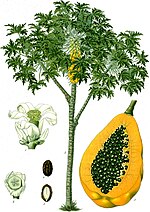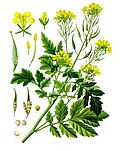Myrosinase (EC 3.2.1.147, thioglucoside glucohydrolase, sinigrinase, and sinigrase) is a family of enzymes involved in plant defense against herbivores...
19 KB (2,002 words) - 03:06, 15 September 2024
Mustard oil bomb (redirect from Glucosinolate-myrosinase complex)
The mustard oil bomb, formerly known as the glucosinolate–myrosinase complex, is a chemical herbivory defense system found in members of the Brassicaceae...
3 KB (360 words) - 21:05, 29 December 2021
"mustard oil") upon hydrolysis of the thioglucoside bond by the enzyme myrosinase. The semisystematic naming of glucosinolates consists of the chemical...
23 KB (2,603 words) - 13:20, 24 October 2024
a grayish-white to powdery blue appearance. Cabbage aphids produce a myrosinase (beta-thioglucoside glucohydrolase) enzyme in head and thoracic muscles;...
6 KB (532 words) - 01:29, 24 August 2023
are also available. However, many of these products are produced from myrosinase-inactive sprout or seed extracts.[citation needed] It is difficult, if...
4 KB (474 words) - 15:10, 21 January 2024
isothiocyanate group of organosulfur compounds. It is produced when the enzyme myrosinase transforms glucoraphanin, a glucosinolate, into sulforaphane upon damage...
5 KB (334 words) - 19:03, 26 March 2024
vegetables. Glucoraphanin is converted to sulforaphane by the enzyme myrosinase. In plants, sulforaphane deters insect predators and acts as a selective...
7 KB (580 words) - 16:36, 1 November 2024
mustard (Brassica juncea). When these mustard seeds are broken, the enzyme myrosinase is released and acts on a glucosinolate known as sinigrin to give allyl...
10 KB (846 words) - 08:22, 18 October 2024
chewed). Under these conditions, a chemical reaction between the enzyme myrosinase and a glucosinolate known as sinigrin from the seeds of black mustard...
9 KB (977 words) - 15:26, 17 October 2024
Purgatto E, et al. (2008). "Benzylglucosinolate, benzyl isothiocyanate, and myrosinase activity in papaya fruit during development and ripening". J Agric Food...
35 KB (3,799 words) - 03:49, 31 October 2024
allyl isothiocyanate. Upon crushing the flesh of horseradish, the enzyme myrosinase is released and acts on the glucosinolates sinigrin and gluconasturtiin...
28 KB (2,840 words) - 03:11, 3 November 2024
various chemical compounds produced by the plants, including glucosinolate, myrosinase, and isothiocyanate. They are sometimes grown as companion plants and...
38 KB (3,937 words) - 17:15, 27 October 2024
compounds in the seed: the enzyme myrosinase and various glucosinolates such as sinigrin and sinalbin. The myrosinase enzyme turns the glucosinolates into...
30 KB (3,500 words) - 17:14, 16 November 2024
Brassicaceae contain glucosinolates as well as myrosinases inside their cells. When the cell is damaged, the myrosinases hydrolise the glucosinolates, leading...
38 KB (3,975 words) - 10:39, 17 October 2024
sinigrin-containing plant tissue is crushed or otherwise damaged, the enzyme myrosinase degrades sinigrin to a mustard oil (allyl isothiocyanate), which is responsible...
9 KB (727 words) - 18:14, 18 October 2024
affect cancer. Glucosinolates are hydrolyzed to isothiocyanates (ITCs) by myrosinase. ITCs are being investigated for their chemopreventive and chemotherapeutic...
14 KB (1,031 words) - 16:45, 17 November 2024
biosynthesis, PEITC is produced from gluconasturtiin by the action of the enzyme myrosinase. "Dictionary of Cancer Terms: PEITC". National Cancer Institute. Cheung...
3 KB (171 words) - 19:12, 25 October 2023
Sinapis alba, the glucosinolate sinalbin is broken down by enzymes like myrosinase, resulting in the formation of 'white principles.' These white principles...
6 KB (713 words) - 09:10, 10 November 2024
sulfur-containing organic compounds); the hydrolysis reaction is catalyzed by myrosinase and occurs when the enzyme is released on cell rupture caused by maceration –...
34 KB (3,029 words) - 00:27, 29 October 2024
recently shown to be thioglucoside glucohydrolase, a protein of the myrosinase family. Ricca's factors were originally considered to be hormones transported...
3 KB (323 words) - 20:42, 1 July 2024
characterized by the production of glucosinolates, and of the enzyme myrosinase, which acts on glucosinolates to release isothiocyanates. Sinigrin is...
7 KB (692 words) - 21:59, 13 September 2024
white mustard. This compound is broken down as a mustard oil glycoside by myrosinase, releasing the isothiocyanate. The isothiocyanate further decomposes into...
4 KB (306 words) - 08:29, 28 October 2024
by herbivores. Premier examples are substances activated by the enzyme myrosinase. This enzyme converts glucosinolates to various compounds that are toxic...
94 KB (10,727 words) - 04:17, 11 November 2024
responsible for its sharper taste. With regard to enzymes, the protease and myrosinase activities of the Gegeol radish are higher but the α-amylose activity...
7 KB (862 words) - 18:10, 11 August 2024
to form the mustard oil 4-hydroxybenzyl isothiocyanate by the enzyme myrosinase. The less sharp taste of white mustard is because 4-hydroxybenzyl isothiocyanate...
3 KB (191 words) - 10:12, 21 October 2024
chiefly wasabi. Like other isothiocyanates, it is produced when the enzyme myrosinase transforms the associated glucosinolate into 6-MITC upon cell injury....
3 KB (237 words) - 14:24, 12 January 2024
noted the shared possession of certain phytochemicals (glucosinolate, myrosinase, erucic acid and eicosenoic acid). They rejected this connection on the...
12 KB (1,466 words) - 05:42, 8 April 2024
flavour). When the leaves are chewed glucosinolates, through the enzyme myrosinase, are metabolized in isothiocyanates and indoles. One of Trotula's works...
18 KB (2,055 words) - 00:44, 18 June 2024
mustards, and woad. As for other glucosinolates, degradation by the enzyme myrosinase is expected to produce an isothiocyanate, indol-3-ylmethylisothiocyanate...
8 KB (665 words) - 19:07, 7 November 2023
(EC 3.2.1.62), lactase (EC 3.2.1.108); beta-mannosidase (EC 3.2.1.25); myrosinase (EC 3.2.1.147). 6-phospho-beta-galactosidase InterPro: IPR005928 GBA3;...
4 KB (382 words) - 11:49, 13 January 2024



























